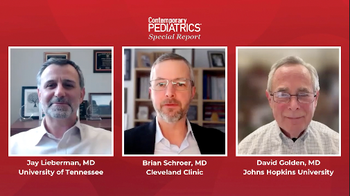
Editorial: Pediatrics: Not just diseases any more
Child advocacy is part of children's health for the future
EDITORIAL
Pediatrics: Not just diseases any more
"The pathology and symptomatology of disease in children who have passed their seventh or eighth year, really differ little from those of adolescents and young adults." L. Emmett Holt, AM, MD 1
Today's pediatricians have recognized that the medical concerns of older children really are distinct from those of adults. Management of patients whose chronic and acute illnesses affect the developing body and mind, through adolescence, is regarded in a continuum that begins with the newborn. In addition, through the second half of the past century, pediatricians have also been concerned with maintaining health and preventing injury and illness.
Recently, I had reason to refer to Luther Emmett Holt's remarkable 1,100-page, single-authored 1900 treatise, The Diseases of Infancy and Childhood1; it is the "Preface" of that book that I quote at the beginning of this essay. I was struck by the many differences between Holt's 100-year-old text and any modern pediatric textbook. There certainly was less to offer in the way of treatment in Holt's era: Pneumonia was treated with alcoholic stimulants (whiskey or brandy were thought best, although sherry or wine was acceptable for the child who would not take stronger drink), and treatment of meningitis was largely futilealthough an ice cap to the head and tincture of iodine along the spine was believed to be of use.
What is particularly notable, however, is that Holt, who lived from 1855 to 1924, neglected behavioral issues and the prevention of injury and disease. In 1900 in the United Statesas in much of the developing world todaythe major killer of infants and children was infection, and even though treatments were limited, it was within the physician's expertise to provide them. In 2001, the death of a child is more often the result of injury, congenital anomaly, homicide, or cancer. Today's pediatrician cannot address the risk of those problems to their patients using a traditional medical model of, as Holt wrote, "pathology and symptomatology." He or she must work along with the rest of society, including elected officials, to address the health risks of childhood.
How will the concerns of pediatricians 100 years from now differ from ours? In the absence of man-made or natural disaster that reverses the course of American culture in dramatic fashion, it is likely that the health of children in 2100 will depend less on new medical and surgical therapies than on political and ethical decisions made by society. Will the policies of government preserve environmental safety? Will there be societal support for the nuclear family? How will the courts, Congress, and public opinion regard the choices that will have to be made as prenatal genetic testing increasingly includes the ability to determine behavioral and medical risks?
In the very first paragraph of Chapter 1 of The Diseases of Infancy and Childhood, Holt declares: "The physical development of the child is essentially the product of the three factorsinheritance, surroundings, and food. The first of these is beyond the physician's power to alter; the second is largely and the third almost entirely within his control...." He doesn't discuss political advocacy as a means of gaining control of the environment in which a child's health is determined, but if we are to improve child health over the next 100 years, we won't be able to do it alone.
Julia A. McMillan, MD, editor-in-chief of Contemporary Pediatrics, is professor of pediatrics, vice chair for pediatric education, and director of the residency training program, Johns Hopkins University Medical School, Baltimore.
REFERENCE
1. Holt LE: The Diseases of Infancy and Childhood. New York, N.Y: Appleton and Company, 1900
Julia McMillan. Editorial: Pediatrics: Not just diseases any more. Contemporary Pediatrics 2001;6:9.
Newsletter
Access practical, evidence-based guidance to support better care for our youngest patients. Join our email list for the latest clinical updates.



